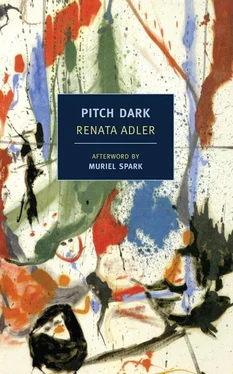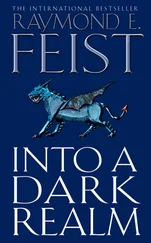Renata Adler - Pitch Dark
Здесь есть возможность читать онлайн «Renata Adler - Pitch Dark» весь текст электронной книги совершенно бесплатно (целиком полную версию без сокращений). В некоторых случаях можно слушать аудио, скачать через торрент в формате fb2 и присутствует краткое содержание. Год выпуска: 2013, Издательство: NYRB Classics, Жанр: Современная проза, на английском языке. Описание произведения, (предисловие) а так же отзывы посетителей доступны на портале библиотеки ЛибКат.
- Название:Pitch Dark
- Автор:
- Издательство:NYRB Classics
- Жанр:
- Год:2013
- ISBN:нет данных
- Рейтинг книги:3 / 5. Голосов: 1
-
Избранное:Добавить в избранное
- Отзывы:
-
Ваша оценка:
- 60
- 1
- 2
- 3
- 4
- 5
Pitch Dark: краткое содержание, описание и аннотация
Предлагаем к чтению аннотацию, описание, краткое содержание или предисловие (зависит от того, что написал сам автор книги «Pitch Dark»). Если вы не нашли необходимую информацию о книге — напишите в комментариях, мы постараемся отыскать её.
Pitch Dark Composed in the style of Renata Adler’s celebrated novel
and displaying her keen journalist’s eye and mastery of language, both simple and sublime,
is a bold and astonishing work of art.
Pitch Dark — читать онлайн бесплатно полную книгу (весь текст) целиком
Ниже представлен текст книги, разбитый по страницам. Система сохранения места последней прочитанной страницы, позволяет с удобством читать онлайн бесплатно книгу «Pitch Dark», без необходимости каждый раз заново искать на чём Вы остановились. Поставьте закладку, и сможете в любой момент перейти на страницу, на которой закончили чтение.
Интервал:
Закладка:
Well, there’s all that. But when the two policemen later asked me, in my apartment, Why did you have all those things in your handbag, I could not explain. I said, Well, I live in two places. But I had once, in my way, I remembered, thought it through. My house in the country cannot really be locked. I myself have at times pried open and gone through the window. City apartments; well, even our brownstone has had some of the strangest intruders, including one young white man whom the tenants upstairs saw trying to lever my door from its hinge with, of all things, a piece, a tine is it? of the banister. So I carried the objects I most loved and valued. What I must have thought is, essentially, to get these, if fate wants to take these, it will have me, what can I have meant but my physical person? it will have me to reckon with. So I gave up. And while I was simply enumerating objects, the watch, the tie clip, the krugerrand from the fiftieth anniversary, I suddenly said, And wouldn’t you know it would happen after an evening with a radical lawyer? The policemen looked up. They had initially thought, before they asked me that is, that I was a teacher. But now we talked for a moment; and there was the obverse, yet the unmistakable counterpart, of the tension I had felt with the radical lawyer himself, and his wife. I wished, as I had wished earlier that evening, that I could unsay something. Then it seemed all right. As they left, though, one of them said, Well, here we go, the Gestapo after those poor boys from the underclass. Quanta. It’s better without the scarf.
I think, Frank said, within two years, we are going to have a little nuclear war somewhere.
You mean a little dust-up.
A little dust-up, with a little fallout.
Every few years, since the early sixties, I have received a piece of hate mail, unsigned, postmarked Bridgeport or Hartford, from Rosalie Kamarski. The letters, on unevenly torn and folded pages of lined notebook paper, are forwarded to me from the place where I lived as a child. My parents still live, in summer, at the same address; and though the rural street number has been changed several times over the years, as the township grew, the number on the envelope is always one digit off what the old address used to be. Some years, the handwriting is tidy; other years, it’s a meandering scrawl. But wherever I am, and although I hardly knew her, I have always known, when those envelopes arrive, that the message inside is hers, and that for some reason I have heard again from Rosalie Kamarski. In high school, where the few conversations we ever had took place, Rosalie was a small, dark, rather kittenish girl, with even features and an extremely soft, soft voice. The only indications I can think of that there was, even then, something amiss were the softness of the voice; the fact that, when she had once said to me, softly, reverently, “You know, Sy Misler is a genius,” and I had said I didn’t really think so, Rosalie, in every subsequent conversation would ask, several times, “But really, why don’t you think Sy Misler is a genius?”; perhaps also, that she once revealed to me, smiling, in that voice, that she had a terrible fear of butterflies (but one of the kindest, sanest friends of my adult life, it turns out, has the same fear), and of course that, pretty as she was, by the standards of that time and place, Rosalie seemed to have no friends. Every grade, in every school, in every town, of whatever size, in those days, was said to have its genius; and Sy Misler was generally considered to be ours. I don’t know why I questioned it, at least aloud. From Rosalie’s insistent returning to the subject, I took it that she was in love. The fear of butterflies surprised me, as did, in Rosalie’s case, the lack of friends. But I had only one friend myself, and he was at another school, the trade school. I feared, and generally tried to avoid the central high school. In a pale green Ford, passed on to me by my brothers, I would skip school as often as I dared to. And I had, in general, such problems of my own that I hardly thought of Rosalie as troubled, hardly thought of her at all. Certainly not as holding any grievance that had to do with me, except perhaps in the matter of Sy Misler; certainly not as in any way deranged. But suddenly they began, these letters, arriving at intervals of several years: You cheated in Latin; We all knew you were going out with a poor boy; We knew how you used to cheat in Latin; You look old and ugly; I hope you die soon; Everyone knows. In the early years, I used to keep these communications, for some reason, until I lost them. Then, I began to throw them out, as soon as I noticed, from the opening words and the lined paper, what they were. In recent years, I sometimes burn them. But this morning, after I received and burned one, unread, I thought, this correspondence is real, these letters always seem to reach me, forwarded inadvertently from my childhood home. Maybe, in spite of no return address, Rosalie expects an answer, an acknowledgment of some sort; maybe she wants to appear in print; maybe she wants none of these things. But here it is, here she is, Rosalie. I hope she will stop writing to me now. Are we speaking of the anti-claque? No, not at all, of an actual person.
They were playing That Was the Night When the Lights Went Out in Georgia. They were playing Bach: Ich Hatte Viel Bekuemmerniss. In the matter of the Irish thing. Do you sometimes wish it was me. Always. Pause.
So it is to be another Christmas, then, and another New Year’s on my own. Well, it is all right. I have grown used to it, have come almost to prefer it. Those days for most adults, it is generally acknowledged, and perhaps for all but the fewest children are so grim. Along with birthdays and of course Thanksgiving, only worse. Why observe them, then, unless one is for the sake of the children, or the office, or someone else’s sake, obliged to. Well, no reason. I remember the years when I used to go, on New Year’s Eve, to the gatherings of that dwindling, aging group of German refugee intellectuals. They drank a little wine, and they ate nuts and those little open sandwiches with anchovy paste or radishes, and like everyone else in the Western world they were looking at the clock. Those occasions were entirely in German, and one year, after several years, Professor Hans Ehrlich turned to me and said, Kate, I didn’t realize you understood German. He said it in German of course, and since I could not recall having spoken a word of English at New Year’s in that room, I was still taking in that word “understood,” when Grete said, Yes, and isn’t it a shame; she used to speak it. Only then did I realize that they were hardly aware that all their conversation, when they were among themselves, was in their native language; and that my command of the language, though still easy and fluent, was becoming more overgrown with error over the years. Over the years, too, I became more and more confirmed in a sort of superstition: that I needed to be in bed, and sound asleep, before midnight on December thirty-first. So I would look at my watch, and at about ten-thirty I would say, I must go home now; you see, I have this silly superstition. And every time, every single time, whoever I was talking to would become, visibly, distrustful. What kind of fool do you take me for, they (too) were much too polite to say; you are younger than we, you are going to meet somebody else, you have something better to do at midnight. And I, I of course could never say, If I had something better to do, if there were something better, why would I have come? Well, but Christmas. This year, as in the years going back some time now, I guess I’ll not join somebody’s Christmas, either some other family’s or that group of strays, situated rather as I am, who now travel together to spend their time in New Delhi or at Vail. From the fact that I seem to have that choice, it is clear that I am not at all one of the neediest cases — though, for years, long ago, I may have been, in at least the sense that I had no friends. No, here I am, not friendless, and the choice is mine. Why mention it, then, why allude to it at all. Because it would be part of what I know, part of what I have to tell, that I understand something, not everything, but something, of what it is to be alone. In this way. And that there must be others who are and have always been alone. In this way.
Читать дальшеИнтервал:
Закладка:
Похожие книги на «Pitch Dark»
Представляем Вашему вниманию похожие книги на «Pitch Dark» списком для выбора. Мы отобрали схожую по названию и смыслу литературу в надежде предоставить читателям больше вариантов отыскать новые, интересные, ещё непрочитанные произведения.
Обсуждение, отзывы о книге «Pitch Dark» и просто собственные мнения читателей. Оставьте ваши комментарии, напишите, что Вы думаете о произведении, его смысле или главных героях. Укажите что конкретно понравилось, а что нет, и почему Вы так считаете.












